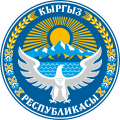Emblem of Kyrgyzstan
| Emblem of Kyrgyzstan | ||
|---|---|---|
Shield | Azure, a rising sun or, the Tian Shan mountains proper, and fields azure; overall, a falcon displayed argent. On either side, sheafs of wheat and cotton proper. | |
The National emblem of Kyrgyzstan was adopted in 2016. The emblem has a circular form which mostly bears the color blue. Light blue is known as the Kyrgyz color of courage and generosity (c.f. the flag of Kazakhstan and the emblem of Kazakhstan). To the left and right of the coat of arms, wheat and cotton are displayed. In the upper part, the name of the country appears in Kyrgyz "Кыргыз Республикасы" (Kyrgyz Respublikasy). It was designed by A. Abdraev and S. Dubanaev.[1]
Description

The emblem was in a circular in which the conventional language of symbols expresses the mentality, nature, culture and management of the Kyrgyz people.
In the foreground in the lower most part of the blue circle is a frontal image of a white falcon with wings wide open. The bird "Ak Shumkar" as a symbol of purity and nobleness of thoughts is sung in legends and folk epos. The image on the emblem that the bird means a way of life, the traditional culture of the Kyrgyz people and symbolizes the protection of the Kyrgyz land stretching behind it with
The centre plot has a decorative frame in the form of a ribbon strip giving the necessary information: the word “Кыргыз” (Kyrgyz) is located in the upper part, and “Республикасы” (Republic) in the lower part. The sides of the frame contain decor, composed of motifs of the ornament, stylized opened cotton bolls, ears of wheat - the main cultivated crops on Kyrgyz soil.
The emblem is executed in warm-cold colours. The light silhouette of the image on a dark background is strict and expressive. A circle is outlined by a contour line.[2]
Colour specifications
The following are the Pantone colours adopted from the government's website:[3]
| Colour | PANTONE | CMYK
|
RGB
|
HEX |
|---|---|---|---|---|
| Royal Blue | PANTONE 2945 C | 100 - 53 - 2 - 16 | 0 - 102 - 161 | #0066a1 |
| Medium Yellow | PANTONE 123 C | 0 - 29 - 100 - 0 | 253 - 188 - 45 | #fdbc2d |
| Silver | PANTONE Cool Gray 5 C | 0 - 0 - 0 - 28 | 195 - 195 - 195 | #c3c3c3 |
| Sky Blue | PANTONE 2995 C | 100 - 0 - 0 - 0 | 0 - 175 - 239 | #00afef |
History
Before independence from the USSR, Kyrgyzstan had a
Gallery
-
The coat of arms of the Kirghizia under the Soviet Union and the independent Kyrgyzstan from 31 August 1991 to 3 January 1994.
-
Original version used from 1994 till its modification in 2016.
-
Emblem of theState Border Guard Service.
See also
References
- ^ "Государственные символы » Кыргызстан » Официальный сайт президента Киргизской Республики" (in Russian). www.president.kg. Retrieved January 22, 2020.
- ^ a b "Государственная символика :: ГРС ППКР" (in Russian). grs.gov.kg. Retrieved January 22, 2020.
- ^ "Государственная символика :: ГРС ППКР" (in Russian). grs.gov.kg. Retrieved January 22, 2020.




